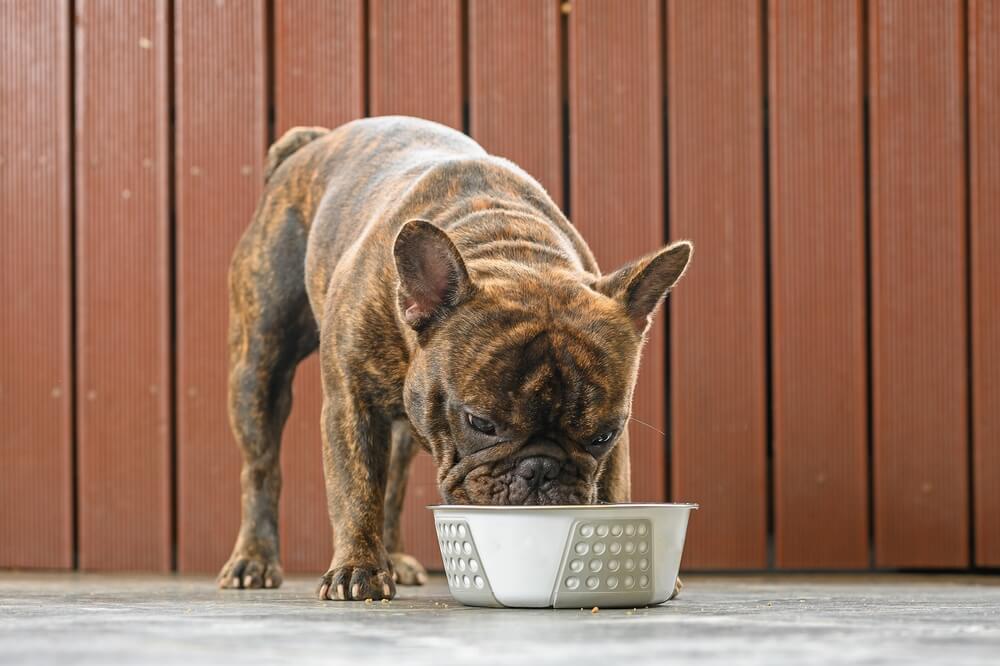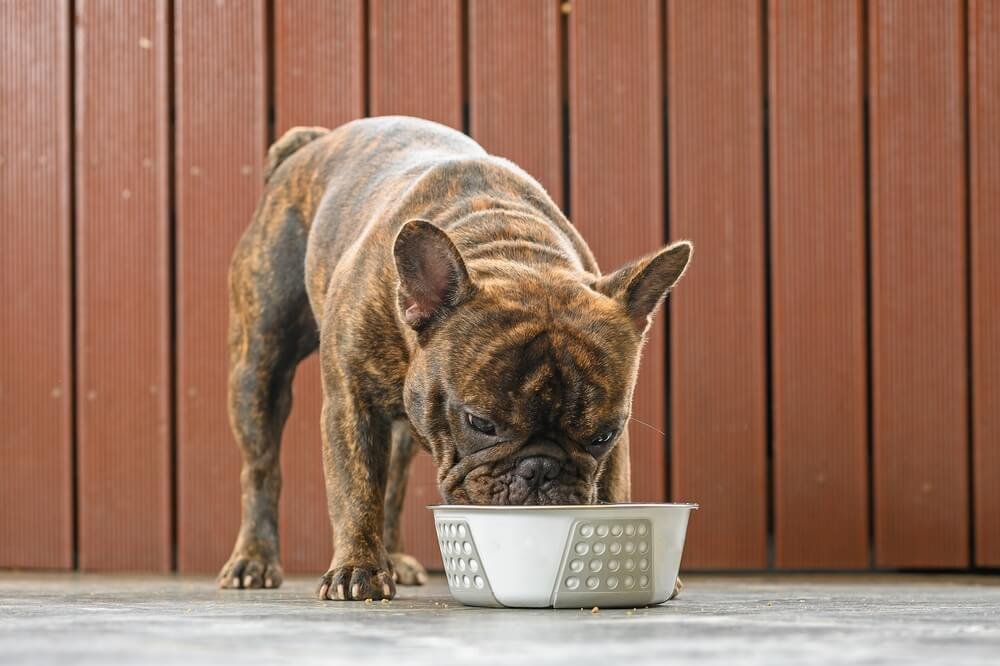French Bulldogs have a unique way of eating that sets them apart from other dog breeds. With their characteristic flat faces and short noses, they have special needs when it comes to mealtime. One surprising fact about how French Bulldogs eat is that they often struggle with breathing while eating, which can lead to potential health issues if not addressed properly.
Understanding the specific needs of French Bulldogs when it comes to eating is crucial for their overall well-being. Due to their brachycephalic anatomy, they are prone to choking and swallowing air while eating. This makes it important to provide them with properly sized and shaped food that is easy for them to consume. Ensuring a safe and comfortable eating environment for French Bulldogs is essential to prevent any complications and promote their health.
French Bulldogs should be fed in a calm and quiet environment to minimize distractions. Use a high-quality dog food formulated for their specific needs. Serve their meals in a shallow dish to accommodate their shortened snouts. French Bulldogs tend to eat quickly, so it’s important to monitor their portions and prevent overeating. It’s recommended to feed them small, frequent meals throughout the day to avoid potential digestive issues.

Feeding Habits of French Bulldogs
French Bulldogs are adorable and affectionate pets that bring joy to many households. As a dog owner, it is important to understand how to properly feed your French Bulldog to ensure their health and well-being. This article will discuss the eating habits of French Bulldogs and provide insights on how to feed them effectively.
1. Meal Size
French Bulldogs have a small stature, which means they have smaller stomachs compared to larger dog breeds. It is important to feed them smaller, frequent meals instead of one large meal. This helps prevent digestive issues and reduces the risk of bloating or gastric torsion.
As a general guideline, adult French Bulldogs should be fed around 1/2 to 1 cup of high-quality dog food per day, divided into two meals. It’s important to consult with your veterinarian to determine the appropriate amount of food for your specific dog based on their activity level, age, and overall health.
2. Choosing the Right Food
When it comes to selecting food for your French Bulldog, it is important to choose a high-quality dog food that meets their nutritional needs. Look for a brand that uses real meat as the first ingredient and does not contain artificial additives or fillers.
French Bulldogs can be prone to food allergies or sensitivities, so it’s important to avoid ingredients that may trigger these reactions. Common allergens for dogs include wheat, soy, and corn. If you suspect your French Bulldog has food allergies, consult with your veterinarian to determine the best diet for them.
3. Feeding Schedule
Establishing a consistent feeding schedule is important for French Bulldogs. They thrive on routine and having set mealtimes helps regulate their digestion and prevents them from overeating.
It is recommended to feed your French Bulldog at the same time each day, dividing their daily food portion into two meals. Avoid free-feeding, where food is constantly available, as this can lead to obesity and other health issues.
4. Feeding Method
French Bulldogs have a unique facial structure with a flat face and short nose, which can make it challenging for them to eat from traditional deep food bowls. Using a shallow, wide bowl or a specially designed French Bulldog food bowl can help make mealtime easier for them.
Additionally, some French Bulldogs may eat too quickly, which can lead to digestive issues or bloating. To prevent this, you can use slow-feed bowls or interactive feeders that require them to work for their food and slow down their eating pace.
5. Water Access
Proper hydration is essential for French Bulldogs, especially since they can be prone to heat sensitivity. Always ensure that fresh, clean water is accessible to your French Bulldog at all times. Keep an eye on their water intake and refill the bowl regularly.
6. Treats and Snacks
Treats and snacks can be a great way to reward your French Bulldog, but it’s important to choose healthy options and avoid overfeeding. Opt for treats that are specifically made for dogs and avoid giving them human food, which may contain harmful ingredients.
When giving treats, be mindful of the calorie content and adjust the portion of their regular food accordingly. Treats should only make up a small percentage of their daily caloric intake to ensure they are receiving the proper nutrition from their main meals.
7. Slow Transition to New Food
If you need to switch your French Bulldog to a new type or brand of dog food, it’s important to do it gradually. Sudden changes in diet can cause stomach upset and digestive issues.
Start by mixing a small amount of the new food with their current food and gradually increase the proportion of the new food over a week or two. This allows their digestive system to adjust to the new food without any discomfort.
8. Monitoring Weight
French Bulldogs have a tendency to gain weight easily, so it’s important to monitor their weight and body condition regularly. Obesity can lead to various health issues, including joint problems and respiratory difficulties.
If you notice your French Bulldog is gaining weight, consult with your veterinarian to determine the best course of action. They may recommend adjusting their diet or increasing their exercise to help maintain a healthy weight.
9. Special Dietary Considerations
French Bulldogs may have certain dietary considerations depending on their specific health conditions. For example, if your French Bulldog has a sensitive stomach or food allergies, your veterinarian may recommend a specialized diet to address these issues.
Additionally, if your French Bulldog is recovering from surgery or has a medical condition that requires a specific diet, it’s important to follow your veterinarian’s recommendations for their feeding plan.
10. Regular Vet Check-ups
Regular visits to the veterinarian are crucial for the overall health and well-being of your French Bulldog. Your veterinarian can assess their weight, body condition, and overall health during these check-ups. They can also provide additional guidance on their diet and feeding habits based on their individual needs.
Conclusion
Properly feeding your French Bulldog is essential for their overall health and well-being. By understanding their unique eating habits and following a balanced feeding routine, you can ensure that your French Bulldog stays healthy and thriving. Remember to consult with your veterinarian for personalized advice and recommendations.
Key Takeaways: How Do French Bulldogs Eat?
1. French bulldogs have a unique eating style due to their short snouts, which can make it difficult for them to pick up food.
2. They should be fed smaller and more frequent meals to prevent them from choking or inhaling their food.
3. Slow feeder bowls or puzzle feeders can help slow down their eating and prevent them from overeating.
4. It’s important to monitor their weight and adjust their portion sizes accordingly to maintain a healthy diet.
5. They should always have access to fresh water, especially during meal times, to stay hydrated.
Frequently Asked Questions
Here are the answers to some commonly asked questions about how French Bulldogs eat.
1. What is the best feeding schedule for a French Bulldog?
Feeding your French Bulldog on a regular schedule is important to maintain their health and well-being. It is recommended to feed adult French Bulldogs twice a day, with a consistent amount of food at each meal. Puppies, on the other hand, may require more frequent meals, typically three to four times a day, until they are around 6 months old.
Dividing their daily food intake into two meals helps prevent bloating and improves digestion. Make sure to establish a consistent feeding routine and stick to it as much as possible, including feeding at the same time each day. Remember to provide fresh water at all times.
2. Should I use a regular bowl or a specialized feeding dish for my French Bulldog?
When it comes to choosing a feeding dish for your French Bulldog, it depends on their individual needs and preferences. Some French Bulldogs prefer eating from a regular bowl, while others may benefit from a specialized feeding dish. One popular option is a slow feeder bowl, which is designed with obstacles or patterns to slow down your dog’s eating pace.
Using a slow feeder bowl can help prevent your French Bulldog from eating too quickly, reducing the risk of choking, overeating, and digestive issues. It also promotes mental stimulation as they have to figure out how to navigate the obstacles to get to their food. Consult with your veterinarian to determine the best feeding dish option for your individual French Bulldog.
3. What type of food should I feed my French Bulldog?
Choosing the right type of food for your French Bulldog is crucial for their overall health and nutrition. It is recommended to feed them high-quality, balanced dog food that is specifically formulated for their age, size, and activity level. Look for dog food that lists real meat as the first ingredient and avoids artificial additives and fillers.
French Bulldogs may require a special diet if they have any specific health concerns, such as allergies or sensitivities. In such cases, consult with your veterinarian to determine the best diet plan for your French Bulldog’s unique needs. It’s important to note that human food should be avoided, as certain ingredients can be toxic to dogs.
4. How can I prevent my French Bulldog from eating too quickly?
French Bulldogs are known for their voracious appetites and tendency to gobble down their food quickly. Eating too fast can lead to various health issues, including bloating, indigestion, and choking. To prevent your French Bulldog from eating too quickly, there are a few strategies you can try.
One option is to use a slow feeder bowl, as mentioned earlier. Another strategy is to place a large obstacle, such as a tennis ball or a puzzle toy, in their feeding dish. This forces them to maneuver around the obstacle and slows down their eating pace. You can also try feeding smaller, more frequent meals throughout the day to minimize the urge to eat quickly.
5. Are there any foods that French Bulldogs should avoid?
While French Bulldogs can enjoy a wide variety of dog-friendly foods, there are some foods that should be avoided as they can be harmful to their health. Some common foods that French Bulldogs should not consume include chocolate, grapes and raisins, onions and garlic, caffeine, alcohol, and xylitol (a sugar substitute).
These substances can be toxic to dogs and may cause symptoms ranging from gastrointestinal upset to more severe health issues. It’s important to be aware of the potential dangers and ensure that your French Bulldog does not have access to these harmful foods.

What Fruits and Vegetables can you Feed your French Bulldog puppy? | French Bulldog Diet |
French Bulldogs eat by chewing their food thoroughly before swallowing it. They have a short muzzle and flattened face, which can make it more difficult for them to eat certain types of food. It’s important to choose the right size and texture of food for your French Bulldog to ensure they can eat comfortably and avoid choking or digestive issues.
When it comes to mealtime, it’s recommended to feed French Bulldogs smaller, more frequent meals to avoid overeating and obesity. They should have access to fresh water at all times, especially during mealtime. It’s also important to monitor their eating habits and adjust their diet as needed to maintain a healthy weight.
